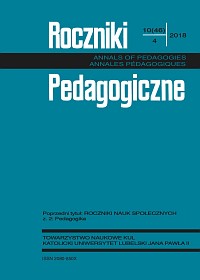Balancing Family and Professional Life and the quality of Life. Analysis of Selected Theoretical Concepts
Main Article Content
Abstract
The aim of the article is to present selected theoretical concepts relating to the problem of balancing family and professional life. The key factor has become the discussion of the approach, developed in the literature on the subject, that captures this relationship in terms of conflict (work– family, family–work). This approach for a long time was dominant in research on the balancing of family and professional roles. The article also discusses a theoretical approach pointing to the positive role of activities aimed at transferring resources and competences between roles. The article ends with a tabular summary of selected empirical data that illustrates the links between the quality of life and the understanding of the family–work relationship in terms of conflict or facilitation.
Article Details
References
Baka, Ł. (2011). Konflikt między pracą i rodziną a wypalenie zawodowe: pośrednicząca rola zasobów osobowych. Psychologia Społeczna, 4 (19), 367-374.
Baka, Ł. (2012). Wymagania w pracy i w rodzinie a satysfakcja z pracy i satysfakcja z małżeństwa. Mediująca rola konfliktów między pracą i rodziną. Polskie Forum Psychologiczne, 7, (1), 172-186.
Borkowska, S. (2011). Ile pracy, ile życia poza nią? W: S. Borkowska (red.), Programy praca – życie. Z teorii i praktyki. Warszawa: IPISS.
Boyar, S.L., Mosley, Jr., D.C. (2007). The Relationship between Core Self-Evaluations and Work and Family Satisfaction: The Mediating Role of Work–Family Conflict and Facilitation. Journal od Vocational Behavior, 71, 265-281.
Clutterbuck, D. (2005). Równowaga między życiem zawodowym a osobistym. Kraków: Oficyna Ekonomiczna.
Greenhaus, J.H., Beutell, N.J. (1985). Sources of conflict between work and family roles. Academy of Management Revew,10 (1), 76-88.
Greenhaus, J.H., Powell, G.N. (2006). When work and family are allies: A theory of work–family enrichement. Academy of Management Review, 31(1), 72-92.
Greenhaus, J.H., Allen, T.D. (2011). Work–family balance: a review and extension of the literature. W: J.C. Quick i L.E. Tetrich (red.), Handbook of occupational health psychology (s. 165-183). Washington DC: APA.
Hanson, G.C., Hammer, L.B., Colton, C.L. (2006). Development nad Validation of a Multidimensional Scale of Perceived Work–Family Positive Spillover. Journal of Occupational Health Psychology, 11(3), 249-265.
Janicka, I. (2008). Konflikt w relacji rodzina–praca a jakość życia jednostki. W: L. Golińska i B. Dudek (red.), Rodzina i praca z perspektywy wyzwań i zagrożeń (s. 418-430). Łódź: Wydawnictwo Uniwersytetu Łódzkiego.
Kahn, R.L., Wolf, D.M., Quinn, R., Shoek, J.D., Rosenthal, R.A. (1964). Organizational Stress. New York: Wiley.
Kossek, E.E., Ozeki, C. (1998). Work–family conflict, policies, and the job–life satisfaction relationship: A review and directions for Organizational behavior. Human resources research. Journal of Applied Psychology, 83 (2), 139-149.
Kowalczyk, J., Rzepa, T. (2015). Konflikt ról rodzinnych i zawodowych a poczucie satysfakcji z życia. Opuscula Sociologica, 12, 67-76.
Lachowska, B. (2012a). Praca i rodzina. Konflikt czy synergia? Lublin: Wydawnictwo KUL.
Lachowska, B. (2012b). Konflikt i facylitacja między rolami rodzinnymi i zawodowymi a jakość życia pracujących rodziców. Psychologia Społeczna, 7, 4 (23), 353-371.
Lubrańska, A. (2014). Konflikt praca–rodzina i rodzina–praca w aspekcie różnic międzypłciowych i międzypokoleniowych. Medycyna Pracy, 65 (4), 521-533.
Oleś, P. (2002). Jakość życia w zdrowiu i chorobie. W: P. Oleś, S. Steuden i J. Toczołowski (red.), Jak świata mniej widzę: zaburzenia widzenia a jakość życia (s. 37-42 ). Lublin: TN KUL.
Patterson, J.M. (2002). Integrating family resilience and family stres theory. Journal of Marriage nad the Family, 64, 349-360.
Seligman, M.E.P. (2002). Authentic happiness: Using the new positive psychology to realize your potential for lasting fulfillment. New York: Free Press.
Tomaszewska-Lipiec, T. (2014). Równowaga praca – życie pozazawodowe czynnikiem wspomagającym rozwój zawodowy. Polityka Społeczna, 3, 17-22.
Voydanof, P. (2005). Social integration, work–family conflict and facilitation, and job and marital quality. Journal of Marriage anf Family, 67, 666-679.
Wayne, J.H., Grzywacz, J.G., Carlson, D.S., Kacmar, K.M. (2007). Work–family facilitation: A theoretical explanation and model of primary antecedents and consequences. Human Resource Management Review, 17, 63-76.
Zalewska, A.M. (2003). Dwa światy. Emocjonalne i poznawcze oceny jakości życia i ich uwarunkowania u osób o wysokiej i niskiej reaktywności. Warszawa: Akademica.
Zalewska, A. (2008). Konflikty praca–rodzina – ich uwarunkowania i konsekwencje. Pomiar konfliktów. W: L. Golińska i B. Dudek (red.), Rodzina i praca z perspektywy wyzwań i zagrożeń (s. 403-418). Łódź: Wydawnictwo Uniwersytetu Łódzkiego.
